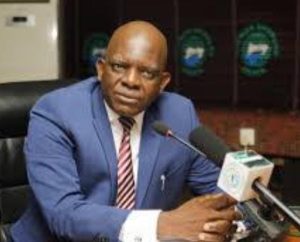Why Nigeria is Yet to Float National Shipping Line, by Amaechi
*Blames, petroleum ministry, NNPC for not supporting cabotage shipping regime
Transportation Minister, Hon Rotimi Amaechi, Wednesday gave reasons why Nigeria is yet to have a national shipping line.
Amaechi who spoke on the occasion of the “Going for Growth 2.0,” held in Abuja explained that it was because the petroleum Ministry failed to implement the Cabotage shipping regime which in turn discouraged private investors in the national shipping line project.
He said that it was such that when his Ministry made every effort travelling to Singapore to get foreign investors for partnership with Nigerians, no Nigerian company showed interest till date.
The Transport Minister who expressed concern over this development said that it does not happen in other advanced countries for a government Ministry to fail to encourage laws that will protect indigenous development.
He gave China as an example where Nigeria had gone to bring metals for the tracks and wanted Nigerian company to handle it only to be told that the Chinese law does not encourage such transaction.
He said, “When we were to bring in the metals, the iron for the tracks, just to move it from China to Nigeria and I was excited to support a Nigerian company that has a shipping line to bring it from China to Nigeria.
“And you know the response we got? That there’s a Chinese law that says only Chinese vessels can carry Chinese cargoes.
“Now, we had that law but either NNPC or the Minister of Petroleum has refused to implement that law…Now if you want to encourage private sector investment in Nigeria, then that law should be implemented.
“In fact, when I became Minister for Transport, I announced to the country that we will establish a national shipping line. So what does the law say – 60 per cent of Nigerian investors and 40 per cent of foreign.
“We travelled to Singapore and a foreign company in Singapore was ready to invest. We came back here, till today no Nigerian has brought one kobo even though we installed a committee for that purpose. That’s why we don’t have a national shipping line today.”
The Minister of Finance, Budget and National Planning, Mrs. Zainab Ahmed Wednesday appealed to Nigerians not to panic over economic crisis as a result of the Coronavirus and the resultant crash in global oil prices.
She assured that everything is being done to reset the economy.
She also called on Nigerians to join the government to adjust their life beyond oil, adding that government will soon implement economic measures that it had earlier delayed.
“For us it was a shock and unexpected; we didn’t think the price of oil would go as low as $30 per barrel. So, it came to us as a great surprise. These are very strong headwinds and these headwinds reinforce a wake-up call for us as a country to look towards a life without oil and the time to do that is now.
“But for all of us in this room, we have a responsibility to ensure that we do not spread panic and that we don’t allow speculation, which will not be in favour of our country. We need to put our hands together to weather this storm.
“This is not something that the government can do alone nor is it something that the private sector can do alone; it has to be a partnership- a very strong one. We need to work together to take the opportunities that this same crisis has provided for us.
“For us in government, there are some measures that we need to take which we have not taken and this is the right time to take those measures.
“We are working as a government to strengthen our macroeconomic fundamentals, which some sectors of the economy were already dished before the crisis and so the crisis is only exacerbating the situation and we knew about that.
“There is no doubt that the combination of crude oil price crash and Coronavirus will put severe strain on our budget revenue, forex and many sectors, we are drastically reviewing the budget as well as redoubling our efforts to raise revenue and plug the leakages and intensify engagement and support of sub-national entities and the private sector in our economic recovery and growth programmes.”





